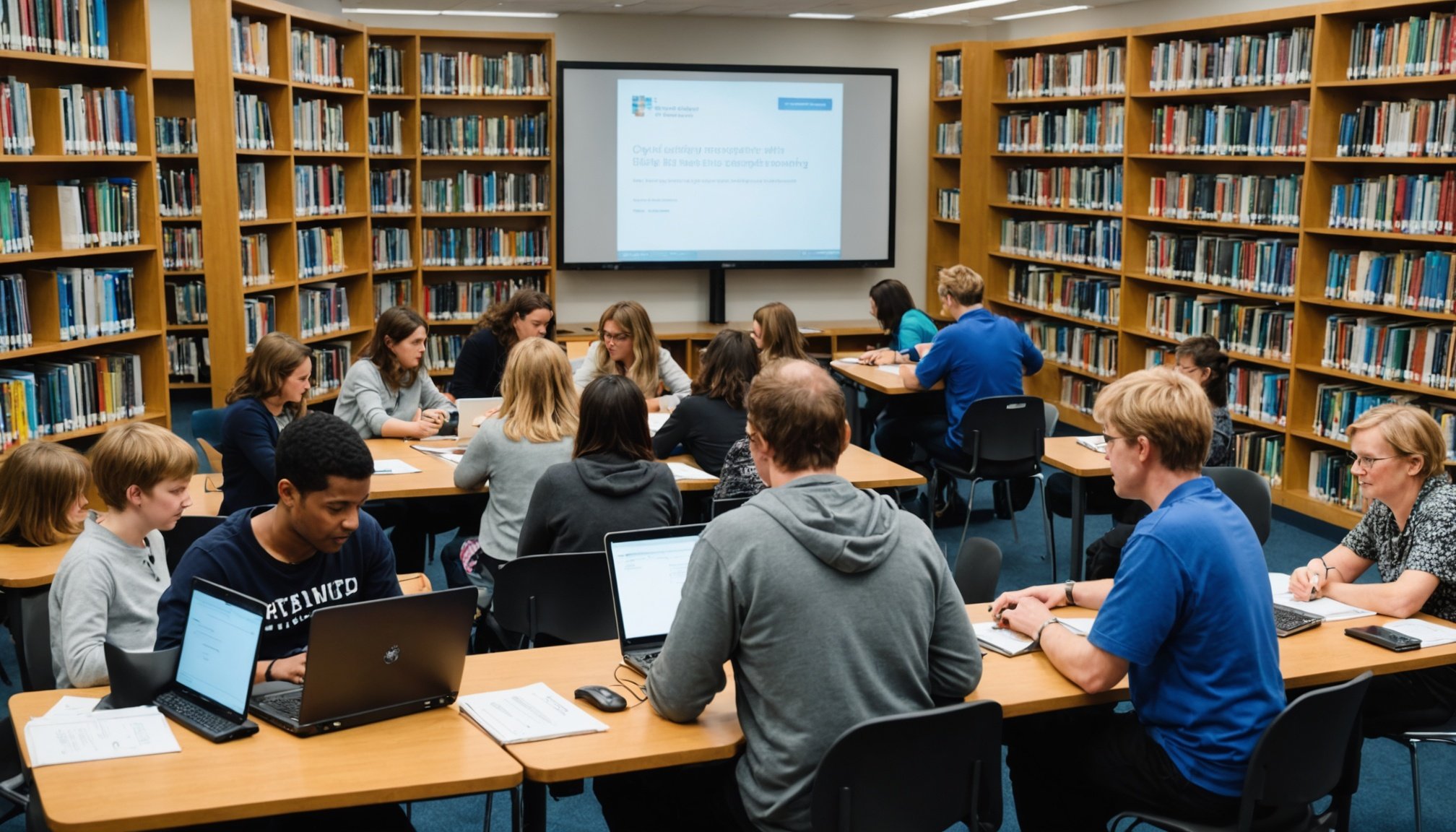The Importance of Digital Literacy in UK Libraries
Understanding digital literacy is crucial in today’s rapidly evolving society. It represents the ability to efficiently navigate, understand, and utilise digital platforms. In the UK, libraries serve as pivotal community hubs, expanding their traditional roles to include digital education. This transformation aims to bridge the digital divide by offering resources that enhance the digital skills of community members.
Role of Libraries
Libraries in the UK are increasingly focusing on community engagement through digital literacy initiatives. They provide not only access to digital tools but also guidance and support for users of all ages and backgrounds. By doing so, libraries foster an inclusive environment where everyone is empowered to participate in the digital world.
In the same genre : Empowering UK Businesses: Essential Strategies for Embracing Diversity and Inclusion
Current Trends
The adoption of digital literacy initiatives is growing across UK libraries. These include workshops, online resources, and collaborations with local organisations to reach a diverse audience. The goal is to create a digitally proficient society, where individuals can confidently access and understand information, communicate, and participate in an increasingly connected world. Libraries are at the forefront of these efforts, continually adapting to technological advancements to meet community needs.
Innovative Strategies for Enhancing Digital Literacy
In a rapidly digitalising world, innovative strategies play a crucial role in elevating digital literacy through library initiatives.
Also read : Transform Your UK Retail Inventory: Unlock Enhanced Efficiency with Predictive Analytics
Community Workshops and Training Sessions
Libraries foster digital skills by hosting community workshops, tailored to address the diverse needs of various demographics. These workshops effectively use technology to enhance learning experiences. Collaborations with local organisations further these efforts, ensuring widespread outreach and engagement.
Online Resources and E-Learning Platforms
A pivotal strategy involves creating digital resource hubs, granting easier community access to educational materials. Libraries implement comprehensive e-learning platforms, extending their reach to broader audiences. Such initiatives have proven successful, enabling seamless learning beyond physical library settings.
Gamification and Interactive Learning
Engagement in digital literacy programs is amplified through gamification. By incorporating interactive learning tools and applications, libraries transform traditional training into an engaging experience. These gamified elements not only make learning enjoyable but also increase participation and retention, evidenced by numerous success stories within library systems.
By embracing these innovative strategies, libraries effectively enhance digital proficiency, fostering a more informed and digitally capable society.
Best Practices for Implementation
Establishing clear objectives is the cornerstone of successful digital literacy programs. These goals guide UK libraries in their mission to enhance community engagement. To do so, libraries need to focus on the fundamentals such as the benefits of the program and the specific skills to be developed.
Engaging key stakeholders is another critical practice. This includes forming partnerships with governmental bodies, local organisations, and tech companies, which can provide necessary resources and support. By fostering these relationships, libraries can secure funding, access to new technologies, and expertise.
Continuous evaluation and adaptation play a pivotal role in the longevity and success of any library initiative. Programs should be regularly assessed through qualitative and quantitative methods to evaluate effectiveness and community impact. Libraries, thus, ensure that their initiatives remain relevant, responsive, and beneficial to the diverse needs of their patrons.
By employing these best practices, UK libraries can successfully implement and maintain effective digital literacy programs, creating a foundation for a digitally enabled society.
Measuring Success and Impact on Community Engagement
Success measurement in digital literacy programs within UK libraries is crucial to determining their effectiveness and impact. By utilising Key Performance Indicators (KPIs), libraries can track progress and make informed adjustments. KPIs may include factors such as the number of participants, improvements in digital skills, and satisfaction rates.
Accurate data collection methods are essential for analysing these metrics. Libraries often employ surveys and feedback forms to gather information from participants regarding their experiences and the success of the programs. This approach allows for a more comprehensive understanding of a program’s impact on community engagement.
Significantly, community participation plays a pivotal role in shaping the success of digital literacy initiatives. Feedback loops involving focus groups can provide ongoing resident input, ensuring that programs remain relevant and effective. Encouraging community involvement fosters a sense of ownership and engagement, key elements for successful programming.
In essence, measuring the success of digital literacy programs helps to highlight both immediate and long-term benefits. Enhanced digital literacy outcomes contribute positively to community development, supporting lifelong learning and bridging the digital divide. UK libraries, by actively measuring and responding to community feedback, serve as catalysts for sustainable digital education.
Challenges and Recommendations
Despite the success of digital literacy programs, UK libraries face challenges in implementing these initiatives. A primary hurdle is the availability of consistent funding and resources. Without adequate support, libraries struggle to maintain and expand their programs.
Technological barriers also present significant challenges. The rapid pace of technological advancements often leaves libraries scrambling to keep up. This disparity can result in a lack of up-to-date resources and tools, limiting program effectiveness.
To overcome these obstacles, libraries are advised to prioritise building strong stakeholder partnerships. Engaging with governmental bodies, tech companies, and local organisations can provide access to funding and expertise. By fostering these relationships, libraries can secure necessary resources and ensure program longevity.
Successful libraries have demonstrated the importance of flexibility and adaptation. By continually assessing and adjusting their approaches, they remain responsive to evolving community needs. An example is a rural library in Scotland that harnessed community feedback to shift its focus to mobile digital training, successfully increasing local participation.
Addressing these challenges with strategic recommendations enables libraries to sustain digital literacy programs, ultimately fostering a more inclusive, digitally competent society.






